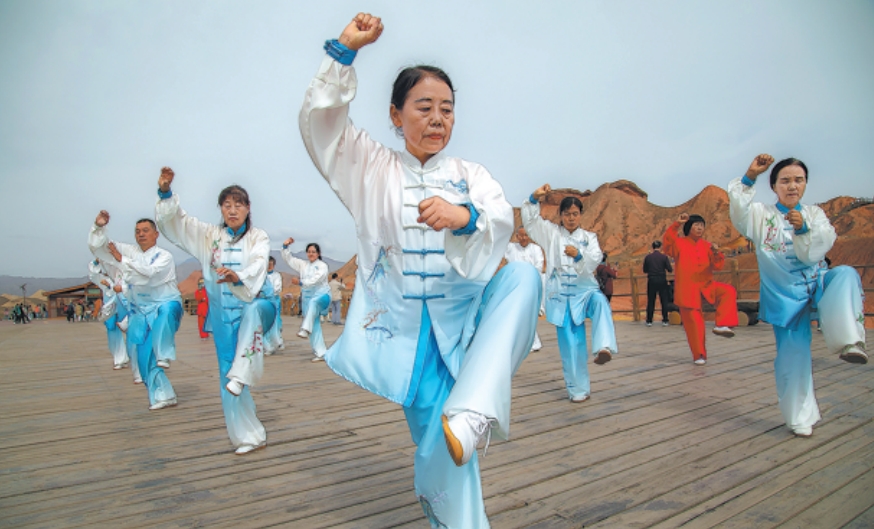Shanghai study finds long-term tai chi helps Parkinson's patients


Long-term tai chi exercise is therapeutic for patients suffering from early-stage Parkinson's disease, with positive effects seen on motor symptoms, non-motor symptoms and motor-related complications, said a research team from Shanghai Ruijin Hospital.
The team's study, led by Chen Shengdi, a professor at Shanghai Ruijin Hospital, provides new evidence for tai chi as a non-pharmacological treatment for Parkinson's.
It found that practicing traditional tai chi, also known as taijiquan, regularly for extended periods can slow the progression of patients' motor symptoms and non-motor symptoms, reduce medicinal dosages, delay neurological decline, reduce burdens on caregivers and reduce the prevalence of motor complications.
"Our study showed that long-term adherence to tai chi exercise is of significance in the intervention of early-stage Parkinson's disease," Chen said.
A paper on the research was published in the Journal of Neurology, Neurosurgery and Psychiatry on Oct 26.
Parkinson's is a progressive and disabling degenerative disease of the nervous system, with slowness of movement, resting tremors and muscle rigidity as the main clinical manifestations. It is estimated that there will be nearly 5 million Parkinson's sufferers in China by 2030.
Doctors say patients face problems with current treatments, including motor and non-motor complications caused by long-term medication, and the limited improvement of balance and non-motor symptoms provided by drugs.
In the research led by Chen, which began in 2016, a total of 143 participants trained with coaches twice a week and practiced regularly at home. Their conditions were compared with a 187-patient control group.
All those in the study were patients with early-stage primary Parkinson's aged between 50 and 80.
Evaluations of patients in the two groups showed differences in their yearly levels of disease progression, and the patients practicing tai chi also needed less medical treatment in terms of both drugs and deep-brain stimulus.
"We also found that participants in the tai chi group had a slower progression in deterioration of autonomic function, cognition, sleep and quality of life, and also had a tendency toward delayed drowsiness compared with those in the control group," Chen said.
The group practicing tai chi also exhibited a lower prevalence of Parkinson's complications and symptoms. Such symptoms include involuntary movement and muscle contraction, which are motor complications, and non-motor issues such as hallucinations, mild cognitive impairment and restless leg syndrome.
Tai chi has been pursued as a treatment for Parkinson's since 2012, when a paper in the New England Journal of Medicine reported that it helped improve patients' motor symptoms, with the specific benefits of long-term practice now further clarified by the Shanghai study.
zhouwenting@chinadaily.com.cn
- HK bets on integrated hub to enhance TCM profile
- China widens net in battle against graft
- New US dietary guidelines trigger widespread concern
- China eyes space leap with record satellite filings
- Team formed to investigate the loss of 29 cultural relics
- Investigation into school uniforms confirms safety of waterproof layer





































